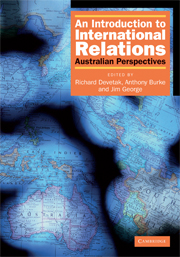Book contents
- Frontmatter
- Contents
- List of tables, figures and boxes
- List of contributors
- Preface and acknowledgments
- An introduction to international relations: the origins and changing agendas of a discipline
- 1 Theory and practice in Australian international relations: the search for identity and security
- Part 1 Theories of international relations
- 2 International relations theory in an era of critical diversity
- 3 Liberalism
- 4 Realism
- 5 Marxism
- 6 Feminism
- 7 Postmodernism
- 8 Constructivism and critical theory
- 9 Global justice and cosmopolitan democracy
- Part 2 The traditional agenda: states, war and law
- Part 3 The new agenda: globalisation and global governance
- Glossary of terms
- Bibliography
- Index
- References
9 - Global justice and cosmopolitan democracy
from Part 1 - Theories of international relations
- Frontmatter
- Contents
- List of tables, figures and boxes
- List of contributors
- Preface and acknowledgments
- An introduction to international relations: the origins and changing agendas of a discipline
- 1 Theory and practice in Australian international relations: the search for identity and security
- Part 1 Theories of international relations
- 2 International relations theory in an era of critical diversity
- 3 Liberalism
- 4 Realism
- 5 Marxism
- 6 Feminism
- 7 Postmodernism
- 8 Constructivism and critical theory
- 9 Global justice and cosmopolitan democracy
- Part 2 The traditional agenda: states, war and law
- Part 3 The new agenda: globalisation and global governance
- Glossary of terms
- Bibliography
- Index
- References
Summary
Introduction
This chapter discusses the cosmopolitan approach to international relations which has, as its principal focus, the twin objectives of global justice and cosmopolitan democracy. It begins with a discussion of the nature of justice as it is understood in the political context. It first addresses the cosmopolitan argument that principles of justice ought to apply to the world as a whole and not just within or between individual states. It then discusses the secondary argument that this requires significant reform of the relations between states and the democratising of the international realm. And finally it also examines the principal accounts of global justice including liberal Rawlsianism and cosmopolitan democracy.
Unlike other theories of international relations, cosmopolitan approaches are first and foremost normative theories. They seek to discuss and identify the proper rules for ordering society and the relationships between its constituent parts. In particular they assess the values which ought to guide social and political life and how they are embodied in institutions and practices. In the language of political theory they discuss ‘the right and the good’. They are not designed to merely explain or understand politics but to assess it normatively. The core concerns of these types of theories are the meaning of justice, equality, freedom and rights, as well as the nature of power, violence and interests. Until relatively recently theories of this type have been rare in the discipline.
- Type
- Chapter
- Information
- An Introduction to International RelationsAustralian Perspectives, pp. 109 - 118Publisher: Cambridge University PressPrint publication year: 2007

